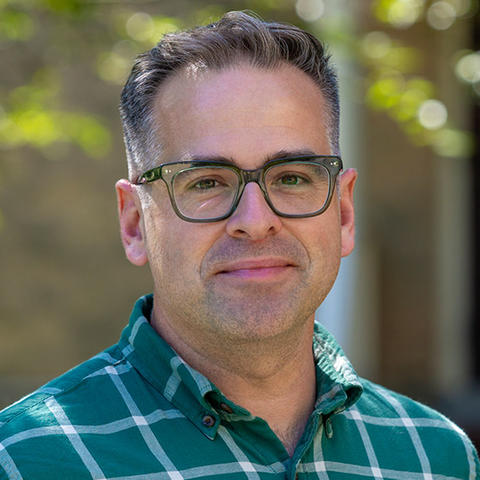Hurford Center for Arts and Humanities Awarded $360,000 Grant from The Pew Center for Arts & Heritage

Photo: Samantha Mitchell, courtesy of Center for Creative Works and Tim Quinn
Details
The grant supports “LOOK HERE,” a project that includes multiple exhibitions, a publication, and a symposium focused on the work of neurodivergent artists.
Haverford College’s John B. Hurford ’60 Center for Arts and Humanities was awarded a $360,000 project grant from The Pew Center for Arts & Heritage to support “LOOK HERE,” a pair of concurrent exhibitions that will advance the work of neurodivergent visual artists. “LOOK HERE” will include exhibitions at Haverford’s Cantor Fitzgerald Gallery and Philadelphia’s Atelier Art Gallery. Together, they will highlight the ways progressive art studios support adults with intellectual disabilities as they pursue careers as artists, challenging and expanding upon conventional approaches to artmaking.
“Far too often, artists who are nurtured by progressive studios are categorized as ‘outsiders,’ a term that is a disservice to the quality and brilliance of the work they create,” says Associate Director, Cantor Fitzgerald Gallery and Campus Exhibitions Matthew Seamus Callinan, the primary coordinator for “LOOK HERE.” “It is our hope that these two comprehensive exhibitions will lend these artists and the studios that support them the attention they deserve.”
“LOOK HERE” builds on years of collaboration between Kristin Lindgren, director of Haverford’s Writing Center, and Samantha Mitchell, exhibitions manager for the Center for Creative Works (CCW), which has studios in Philadelphia and Wynnewood, Pennsylvania. Through the guidance of its director, Lori Bartol, CCW provides a professional art program to adults with intellectual disabilities. Its studios allow artists to explore a wide range of mediums, practices, and access to equipment as they build a portfolio and pursue avenues of professional practice, including exhibiting and selling their work nationally.
Lindgren, who is also a visiting professor focused on disability arts and culture, has paired Haverford students enrolled in her “Critical Disability Studies: Theory and Practice” class with CCW artists for nearly a decade. Together, they’ve explored an array of traditional and emerging artistic practices, such as bioart, 3-D printing, and woodworking. “LOOK HERE” is an evolution of Lindgren and Mitchell’s collaborations and an extension of Haverford’s commitment to community engagement in the Greater Philadelphia area.
“I am exceptionally enthusiastic to collaborate with Haverford College on ‘LOOK HERE.’ CCW has a long relationship with the College and Kristin, and we have worked together each year to provide shared, inclusive experiences for our artists and Haverford students,” says Bartol. “This project is a natural culmination of that work, what we’ve learned, the kindred nature of our missions, and the value placed on the artistic talent of artists in studios such as ours.”
The Cantor Fitzgerald Gallery exhibition will include the work of six CCW artists, while Atelier Art Gallery’s space will highlight the work of neurodivergent artists working in similar progressive studios around the nation. The exhibitions will be co-curated by Paige Donovan and Mary T. Bevlock, both CCW artists, and Jennifer Gilbert, who since 2017 has run Manchester, England’s Jennifer Lauren Gallery, which shows the work of disabled, neurodivergent, self-taught, deaf, and overlooked artists from around the world.
“LOOK HERE” will also foreground principles for inclusive, accessible exhibitions with didactic materials and videos presented in plain language, American sign language, and braille. Other strategies will include social stories, which provide information about noise levels, crowds, and a schedule of events, and ASL interpreters at “LOOK HERE” events.
“This project will highlight the vibrancy of progressive studios across the country, where exciting art is being produced in community and not the isolation typically associated with being an ‘outsider’ artist,” Lindgren says. “The exhibitions will expose the public to this innovative work while also modeling what truly accessible exhibitions and events can look like. In doing so, we want to ensure people with disabilities have the experience of being welcomed and comfortable in our gallery and event spaces so they know that they can be fully included in other galleries, museums, and performance venues too.”
Beyond its exhibitions, “LOOK HERE” will foreground accessibility through numerous public events, a comprehensive publication on progressive studios compiled and edited by Lindgren and Mitchell, and hosting the sixth annual Creating Community Symposium in Philadelphia. The symposium is a program of Creative Growth, an Oakland, California-based progressive studio that has advanced the inclusion of artists with developmental disabilities for 50 years.
About the Cantor Fitzgerald Gallery
An integral part of the Hurford Center, the Cantor Fitzgerald Gallery is the principal venue for the Haverford College Exhibitions Program. Envisioning exhibition spaces as active workshops for the exploration of visual culture, the program partners with faculty, students, staff, and visiting curators to design exhibitions that connect curricular interests and scholarship with contemporary artistic practice. In so doing, the program encourages intellectual inquiry and artistic innovation in the Haverford community and the greater Philadelphia region.
About The Pew Center for Arts & Heritage
The Pew Center for Arts & Heritage is a multidisciplinary grantmaker and hub for knowledge-sharing, funded by The Pew Charitable Trusts, dedicated to fostering a vibrant cultural community in Greater Philadelphia. The Center invests in ambitious, imaginative, and catalytic work that showcases the region’s cultural vitality and enhances public life, and engages in an exchange of ideas concerning artistic and interpretive practice with a broad network of cultural practitioners and leaders.




